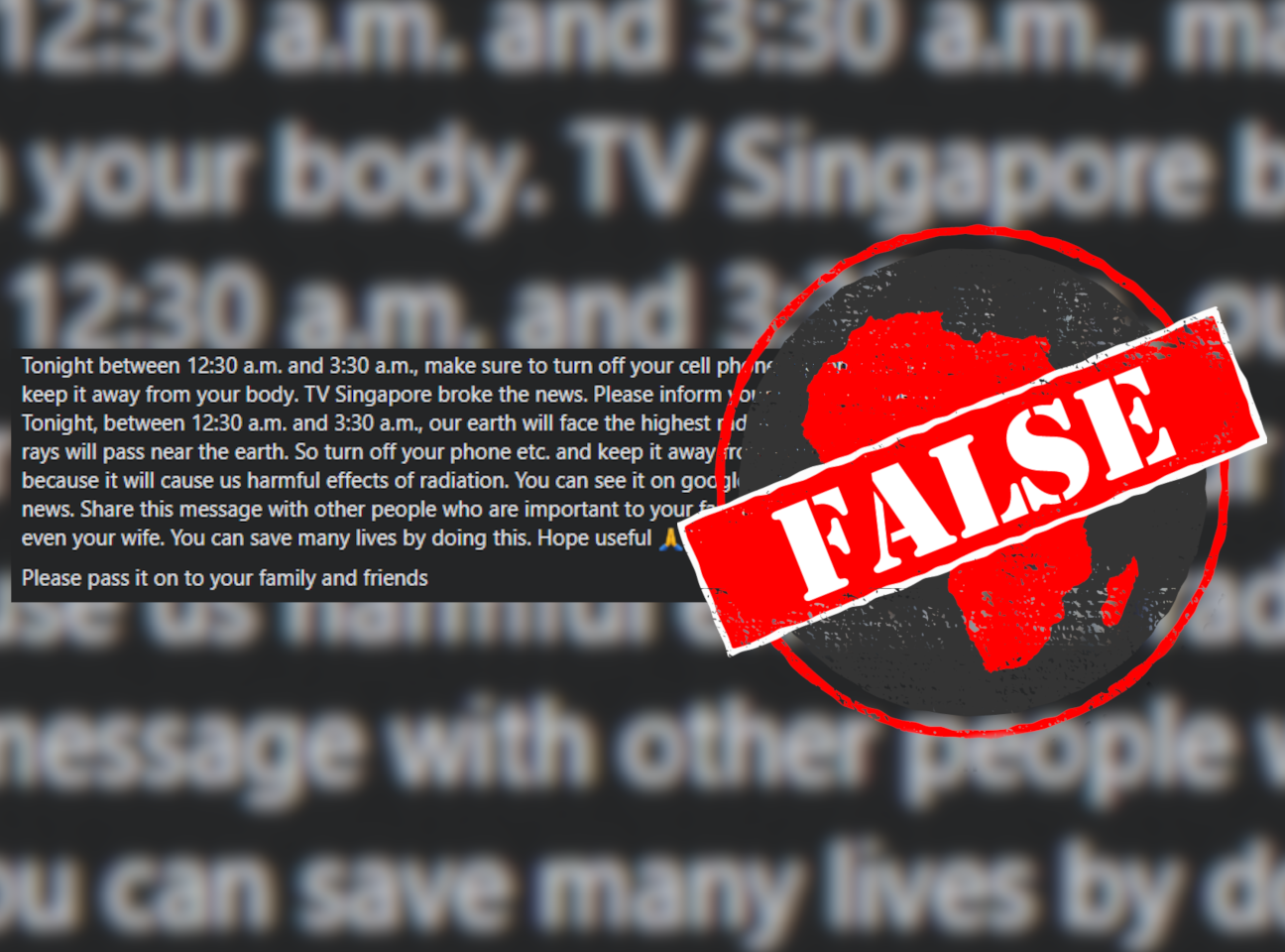IN SHORT: Nasa and the BBC did not warn the public that “cosmic light rays” would “pass close” to the Earth around the time of a total solar eclipse in April 2024. Cosmic rays are constantly washing over the planet, so there’s no need to turn off your electronics to avoid the harmful effects of radiation.
The April 2024 total solar eclipse over North America has sparked many myths, false claims and conspiracy theories.
One is a warning that “tonight”, “cosmic light rays” will “pass near” the Earth, causing us “harmful effects of radiation”.
A total solar eclipse occurs when the moon, in its orbit around our planet, briefly covers the sun. This blocks out sunlight and turns day into night.
The complex interplay of the Earth’s rotation, the moon’s orbit around the Earth, and both orbits around the sun means that total solar eclipses are rare and only occur over small parts of the planet. The much-anticipated 8 April eclipse was only visible in a tight diagonal across parts of Canada, Mexico and the United States.
This video explains more:
The “cosmic light rays” warning appeared on social media in early April in several African countries, including Nigeria, Liberia, Rwanda, Sudan and South Sudan, with a peak just before, during and after the day of the North American eclipse.
The warning is long and repetitive, but these are the basics:
Tonight between 12:30 a.m. and 3:30 a.m. … turn off your cell phone, laptop, etc. and keep it away from your body … our earth will face the highest radiation. Cosmic light rays will pass near the earth … it will cause us harmful effects of radiation. You can see it on google and NASA and BBC news.
Nasa is the US National Aeronautics and Space Administration and the BBC stands for the British Broadcasting Corporation.
The warning adds: “Share this message with other people who are important to your family, friends, friends and even your wife.”
Many of the warnings link it to the 2024 solar eclipse, with comments such as “thankfully not in Africa” and “Only In The Parts Of North America Bruh”.
It spread widely in Sudan and South Sudan. On 8 April, the day of the eclipse, it was posted on AKOKA TV, a Facebook page based in Juba, South Sudan’s capital. The post includes four photos of a solar eclipse.
But the warning is old, and false. Here’s why.

Understanding cosmic radiation
First, there’s no such scientific term as “cosmic light rays”. Cosmic rays is an old term, coined in 1925, for what’s now more commonly known as cosmic radiation. And it doesn’t just “pass near” the Earth. It washes over the planet all the time.
But it’s not the radiation we associate with nuclear power. Radiation comes in many forms and is a part of everyday life. For example, our radios and microwave ovens are powered by radiation.
Cosmic radiation comes from stars, as atoms violently ejected from a star are stripped down to their subatomic particles and hurtled into space.
Some of the cosmic rays that hit the Earth are from collapsed stars, known as black holes, and from the old explosions of other stars, all many trillions and quadrillions of kilometres away.
But most of it comes from the sun, our closest star. Cosmic radiation from the sun is also known as the solar wind, which causes the northern and southern lights. These stunning swirls of colour in the sky – the aurora borealis in the far northern hemisphere and the aurora australis in the far south – show the solar wind interacting with the Earth’s magnetic field.
And that’s key. Earth has a strong magnetic field – a magnetosphere – created by its rotating molten iron core. Mars and Venus, Earth’s neighbours in the solar system and planets made of the same rocky stuff, don’t have a strong magnetosphere. And no life has been detected on them.
The Earth’s magnetosphere and atmosphere – the thick layer of gas that covers the planet – protect us from cosmic radiation. Life here has flourished for billions of years, all the time swept by cosmic rays.
In fact, the regions of the Earth in the moon’s shadow during a total solar eclipse receive a vastly reduced amount of cosmic radiation.
Africa Check could find no warning from Nasa or the BBC that “cosmic light rays” were about the “pass near” Earth.
‘Zombie’ claim that just won’t die
Different versions of the claim have been circulating online since at least January 2010.
At the time, it was claimed that the cosmic rays were coming from Mars. But Mars is a planet, not a star. It doesn’t emit cosmic radiation.
In June 2023, Africa Check debunked another similar claim.
So this is just one example of a “zombie” claim that just won’t die, despite repeated debunking.
Then, as now, the claim is false.
Republish our content for free
For publishers: what to do if your post is rated false
A fact-checker has rated your Facebook or Instagram post as “false”, “altered”, “partly false” or “missing context”. This could have serious consequences. What do you do?
Click on our guide for the steps you should follow.
Publishers guideAfrica Check teams up with Facebook
Africa Check is a partner in Meta's third-party fact-checking programme to help stop the spread of false information on social media.
The content we rate as “false” will be downgraded on Facebook and Instagram. This means fewer people will see it.
You can also help identify false information on Facebook. This guide explains how.



Add new comment